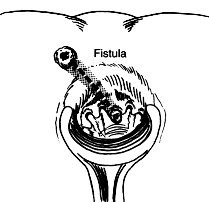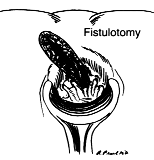A patient who feels ill and complains of chills, fever and pain in the rectum or anus could be suffering from an anal abscess or fistula. These medical terms describe common ailments about which many people know little.
An anal abscess is an infected cavity filled with pus found near the anus or rectum.

Anal abscess treatment diagram.An anal fistula is almost always the result of a previous abscess. Just inside the anus are small glands. When these glands get clogged, they may become infected and an abscess can develop. A fistula is a small tunnel that forms under the skin and connects a previously infected anal gland to the skin on the buttocks outside the anus.
An abscess results from an acute infection of a small gland just inside the anus, when bacteria or foreign matter enters the tissue through the gland. Certain conditions – colitis or other inflammation of the intestine, for example – can sometimes make these infections more likely.
After an abscess has been drained, a tunnel may persist connecting the anal gland from which the abscess arose to the skin. If this occurs, persistent drainage from the outside opening may indicate the persistence of this tunnel. If the outside opening of the tunnel heals, recurrent abscesses may develop.
Anal abscess and fistula are conditions that we commonly see at CRSSNY. An abscess is an infection of the anal glands, causing them to become clogged. A fistula is the path that the infection will take from the inside the anus to the outside. These conditions need to be treated by a specialist.
See more videosAn abscess is usually associated with symptoms of pain and swelling around the anus. Individuals may also experience fatigue, fevers and chills. Symptoms related to the fistula include irritation of skin around the anus, drainage of pus (which often relieves the pain), fever, and feeling poorly in general.
No. A fistula develops in about 50 percent of all abscess cases, and there is really no way to predict if this will occur.
An abscess is treated by making an opening in the skin near the anus to drain the pus from the infected cavity and thereby relieve the pressure. Often, this can be done in the doctor’s office using a local anesthetic. A large or deep abscess may require hospitalization and the assistance of an anesthesiologist. Hospitalization may also be necessary for patients prone to more serious infections, such as diabetics or people with decreased immunity. Antibiotics are a poor alternative to draining the pus, because antibiotics do not penetrate the fluid within an abscess.

Anal Abscess Treatment | Anal Fistula Treatment | Garden CitySurgery is necessary to cure an anal fistula. Although fistula surgery is usually relatively straightforward, the potential for complication exists, and is preferably performed by a specialist in colon and rectal surgery. It may be performed at the same time as the abscess surgery, although fistulas often develop four to six weeks after an abscess is drained, sometimes even months or years later.
Fistula surgery usually involves opening up the fistula tunnel. Often this will require cutting a small portion of the anal sphincter, the muscle that helps to control bowel movements. Joining the external and internal openings of the tunnel and converting it to a groove will then allow it to heal from the inside out. Most of the time, fistula surgery can be performed on an outpatient basis. Treatment of a deep or extensive fistula may require a short hospital stay.
Discomfort after fistula surgery can be mild to moderate for the first week and can be controlled with pain pills. The amount of time lost from work or school is usually minimal.
Treatment of an abscess or fistula is followed by a period of time at home, when soaking the affected area in warm water (sitz bath) is recommended three or four times a day. Stool softeners or a bulk fiber laxative may also be recommended. It may be necessary to wear a gauze pad or mini-pad to prevent the drainage from soiling clothes. Bowel movements will not affect healing.
If properly healed, the problem will usually not return. However, it is important to follow the directions of a colon and rectal surgeon to help prevent recurrence.